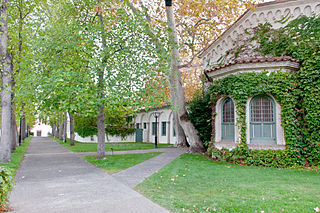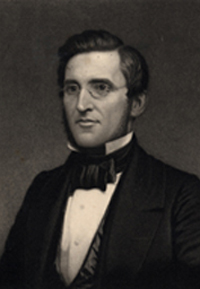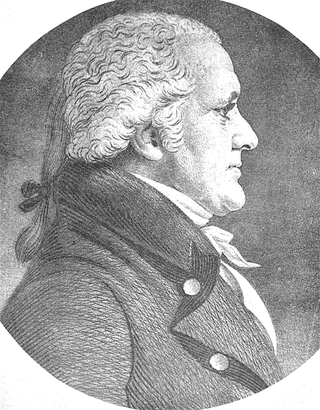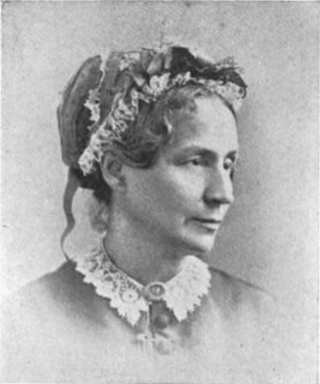Related Research Articles

The Boston Brahmins or Boston elite are members of Boston's traditional upper class. They are often associated with a cultivated New England or Mid-Atlantic dialect and accent, Harvard University, Anglicanism, and traditional British American customs and clothing. Descendants of the earliest English colonists are typically considered to be the most representative of the Boston Brahmins. They are considered White Anglo-Saxon Protestants (WASPs).

William Emerson was one of Boston's leading citizens, a liberal-minded Unitarian minister, pastor to Boston's First Church and founder of its Philosophical Society, Anthology Club, and Boston Athenaeum, and father to Ralph Waldo Emerson.

Leontine Turpeau Current Kelly was an American bishop of the United Methodist Church. She was the second woman elevated to the position of bishop within the United Methodist Church, and the first African American woman.

Women's colleges in the United States are private single-sex U.S. institutions of higher education that only admit female students. They are often liberal arts colleges. There were approximately 26 active women's colleges in the United States in 2023, down from a peak of 281 such colleges in the 1960s.
Catherine Elizabeth Benson, néeBrewer was one of the earliest women to earn a college bachelor's degree in the U.S.

William Fairfield Warren was the first president of Boston University.

Judith Ellen Horton Foster was an American lecturer, temperance worker, and lawyer. She is thought to be the first woman in Iowa who was actually engaged in practice and the fourth woman admitted to practice before the Supreme Court of Iowa. In her time she was known as "The Iowa Lawyer".

Joseph Cummings was an American academic who served as the 5th president of Wesleyan University from 1857 to 1875, the 5th president of Northwestern University from 1881 to 1890, and the president of Genesee College from 1854 to 1857.

Perez Morton was a lawyer and revolutionary patriot in Boston, Massachusetts.
Events from the year 1851 in the United States.
William Russell was an educator and elocutionist. He was formally educated in the Latin school and in the university of Glasgow; and, he came to the US in 1819, wherein that year, he took charge of Chatham Academy in Savannah, Georgia. He moved to New Haven, Connecticut, a few years later, and there he taught in the New Township Academy and also in the Hopkins Grammar School. He then devoted himself to the instruction of classes in elocution in Andover, Harvard, and Boston, Massachusetts. He edited the American Journal of Education 1826–1829. In 1830, he taught in a girls' school in Germantown, Pennsylvania, for a time with Bronson Alcott. He resumed his elocution classes in Boston and Andover in 1838, and he lectured extensively in New England and in New York State. He established a teachers' institute in New Hampshire in 1849, which he then moved to Lancaster, Massachusetts, in 1853. His subsequent life was devoted to lecturing, for the most part, before the Massachusetts teachers' institutes, under the guidance and instruction of the state board of education.
Caroline Wells Dall was an American feminist writer, transcendentalist, and reformer. She was affiliated with the National Women's Rights Convention, the New England Women's Club, and the American Social Science Association. Her associates included Elizabeth Peabody and Margaret Fuller, as well as members of the Transcendentalist movement in Boston.

Mary Richardson Walker was an American missionary. She was the daughter of Joseph and Charlotte Richardson of West Baldwin, Maine. Both parents were school teachers and valued education for all their children. She attended Maine Wesleyan Seminary. Mary wanted to be a missionary and applied at the American Board of Missionaries, but she was turned down, because she was not married.
Alice Beckington was an American painter.
Cogswell is a surname, derived from the town of Coggeshall in Essex. Notable people with the surname include:
Emily Gillmore Alden was an American author and educator. For forty years, Alden was a member of the faculty of Monticello Seminary, and for nearly fifty years, the poet of the school. Alden wrote the commencement day poems for Monticello every year since she entered the institution. Harriet Newell Haskell : a span of sunshine gold was published in 1908 and Poems by Emily Gillmore Alden was published in 1909.
Thayer is an English surname found in Somerset, the name derived from English tawyer, one who dressed skins.

Richard Sutton Rust was an American Methodist preacher, abolitionist, educator, writer, lecturer, secretary of the Freedmen's Bureau, and founder of the Freedmen's Aid Society. He also helped found multiple educational institutions including his namesake Rust College in Holly Springs, Mississippi, the oldest historically black United Methodist-related college.

Eunice Caldwell Cowles was an American educator who influenced hundreds of women in the U.S. and abroad. She was the first associate of Mary Lyon in the opening of Mount Holyoke Seminary. She had previously graduated under Lyon and Zilpah Grant from Ipswich Seminary in 1829, where she was afterwards principal from 1844 to 1876. She also served as the first principal of Wheaton Seminary. She was also affiliated with the Christian Woman's Board of Missions (C.W.B.M.), having co-founded the Essex North Branch and serving as its president.
Evelyn Walton Ordway was an American chemist, suffragist and university professor at Newcomb College in New Orleans. She was a chemistry and physics professor at Newcomb College for seven years and was active in the Louisiana women's suffrage movement, becoming the first president of the Louisiana State Suffrage Association.
References
- 1 2 "Warren, Caroline Matilda (1785–1844)". Encyclopedia.com.
- 1 2 3 "Caroline Matilda Warren Thayer (1791–1844)". Find A Grave .
- 1 2 3 "Thayer, Caroline (Mathilda) Warren". Encyclopedia.com.
- 1 2 Caroline Matilda Warren (17 January 2018). "Preface to the Gamesters". In Peter Rawlings (ed.). Americans on Fiction, 1776–1900. Routledge. doi:10.4324/9781351223461. ISBN 978-1-351-22346-1.
- 1 2 Rawlings, Peter (17 January 2018). Americans on Fiction, 1776–1900 Volume 1. Routledge. ISBN 978-1-351-22344-7.
- ↑ "J.B. CAIN ARCHIVES OF MISSISSIPPI METHODISM (THAYER, (Caroline Matilda) Papers)" (PDF). Retrieved 5 September 2021.
- ↑ Roff, Sandra; Duchin, Douglas (1998). "Mrs. Muzzy—Who Was She? In Search of a Nineteenth-Century Woman Editor". American Periodicals. 8: 45–59. ISSN 1054-7479. JSTOR 20771112.